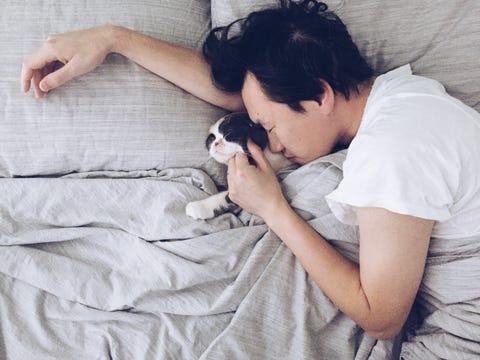A great article from Men's Health Magazine: https://www.menshealth.com/health/a23131434/tips-cant-sleep-at-night/
If you have trouble falling asleep at night, you may be one of the 30% of adults who suffers from insomnia.
Michael J. Breus, PhD, sleep specialist and founder of the website the Sleep Doctor, defines insomnia as when a person has difficulty falling asleep for more than 30 minutes more than three times a week, for more than three weeks a month and for more than three months (he calls this "the rule of threes").
But why are you struggling to fall asleep in the first place?
Breus says that often, people who have trouble falling asleep struggle with anxiety and depression. "I would estimate that this is a major component in about 65% of my cases," he says.
But according to James A. Rowley, a professor of internal medicine at Wayne State University, additional causes include stress at home and/or work, or a stressful life event such as the death of a loved one, an upcoming exam, or a big move. Other common reasons include an irregular sleep/wake pattern, excessive alcohol use, and drinking caffeinated beverages or smoking before bed.
Finally, different medical conditions and sleep disorders can also be linked to insomnia, including obstructive sleep apnea and restless leg syndrome, says Breus.
Once you've ID'ed the cause of your trouble sleeping, here are some tips you can try to help you get back on track.
1) Stick to a pattern.
Maintaining a regular bedtime and wake time is crucial to keeping a steady sleep schedule. "It should not vary by more than 30 minutes each day ideally," says Rowley.
2. Take note of your environment.
You should be sleeping in a dark, cool, and quiet environment. In general, the suggested bedroom temperature should be between 60 and 67 degrees Fahrenheit for optimal sleep, according to the National Sleep Foundation. Try buying blackout curtains ($24.99, buy here) or even a cooling body pad (like this one for $66.99, buy it here) to achieve optimal sleeping conditions.
3) Exercise daily — but not right before bed.
If you tend to stop at the gym after work, make sure to get your workout in at least 4 hours before you go to bed. The boost in body temperature that comes with workouts might interfere with your natural sleep schedule, according to research.
4) Avoid taking long naps during the day.
Long naps can leave you feeling groggy, because they require waking up from a deep sleep. It's also important not to nap too late in the day, because this can make it hard to fall asleep at night.
5) Avoid caffeine 3-4 hours before bed.
If you drink coffee, tea, or another caffeinated drink, limit your intake to one or two cups in the morning. Consuming these drinks in the afternoon and evening can make it hard to fall asleep, or cause you to wake up during the night.
6) Don't drink alcohol before bed.
While alcohol, a depressant, can help you fall asleep faster, it still contributes to poor quality sleep because it can interrupt your circadian rhythm and block REM sleep, which is the most restorative kind of sleep. This can leave you feeling groggy and unfocused when you wake up.




